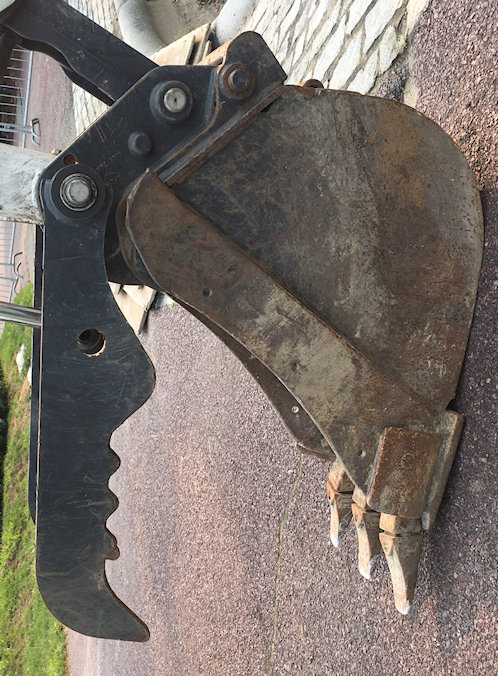A sow bear and a cub were hit by a truck on the road outside my neighborhood.
The cub’s torn black fur and cracked claws lay crumpled beside the blown tires. The sow bear, something soft ruptured behind her bones, scrambled up the incline into the green of Pennsylvania June and died in such a hidden place that turkey vultures still haven’t found her heft.
Today, a week later, in light as full as an afternoon, a surviving cub runs paw-heavy through my family’s backyard. She turns up the side yard smelling for some root or ant hill. The apples that dropped from the trees, too hard and sour to tempt her, the blueberries corralled behind a fence. Finding nothing sweet, she crosses the street and tunnels into the neighbor’s bushes.
The neighbor calls my mother, and we leave our tea in the kitchen—my mother, father, brother, wife, and me—and rush out across the street to the last bush where the bear was seen. Pulled by our desire to love something motherless. On our tongues, promises to feed the cub warm milk, tuna, and oranges.
But also, we’re pulled by the stronger yearning to witness a wild thing. Creatures miraculous in their endurance against all the obstacles we who walk on two legs have set before them. We, who if we lost these wild creatures, would be left with a loneliness so deep and wide the sky couldn’t fill it.
The cub had plunged into the woods by the time we reached the bush, and so the neighbor shows us pictures on her phone of the cub by my brother’s car, our maple, the stones we lined along the flower beds. We coo like soft-throated birds at its shape, tiny mouth open and red. With the drama of the afternoon passed, the small wonder of our day spent, we drift back to our home.
Mom calls the game commission to send a conservation officer. Dad sits in his office to write. My brother heads to the river to fish. My wife and I finish our tea.
Then seven children—the oldest only eight; girls and boys in shorts, flip-flops, and sneakers; some carrying sticks, a couple nerf guns, and one, a water bottle—hike in single file across our yard. They follow the leader, all buzzcut and neon shirt, who must have seen the bear from his window because he traces the path with a primal wandering. A mammalian swaying in his movement. Mind’s eye painting bear tracks in the mowed grass.
“Y’all huntin’ bear?” I call through the screen door.
“Yeah, big bear,” the leader calls back.
“Stay safe inside,” the ponytailed girl adds.
Here in the mountains, we hunt. Schools are closed the opening day of deer season. People in orange vests cross the highways with rifles strapped to their backs.
If I were a child and a bear trotted through my neighborhood, I too would grab a stick and hunt the bear.
These children, who are far from their own deaths, do not want death for this bear. They climb onto the rock in the corner of our yard, shade their eyes from the sun and peer down the valley of plastic siding that leads to the woods.
Through the mercy of child wants and patience, they will not reach the moment of setting their hands on the bear. The children make their way around the corner of the yard until a neighbor’s dog comes bounding, long-legged, to the end of its lead, and the boys and girls scatter like starlings after a shot.
Hunting is no tragedy. Only full of the tiny heartbreaks each of us who eats another must carry forever. Something as natural as the teeth in our heads.
The only catastrophe here, the same happening across the world almost every afternoon, is the path of pursuit that is barbed and strong like a hook in a throat: young things hounding another young thing. Each learning how to stumble through violence. No question about the presence of mothers.
The children make two more laps through our yard trying to regain the track. The afternoon at its strongest.
The sun is so bright and hot I know neither the children nor the cub will last much longer.
__
Noah Davis grew up in Tipton, Pennsylvania, and writes about the Allegheny Front. Davis’ manuscript Of This River was selected by George Ella Lyon for the 2019 Wheelbarrow Emerging Poet Book Prize from Michigan State University’s Center for Poetry, and his poems and prose have appeared in The Sun, Best New Poets, Orion, North American Review, River Teeth, Sou’wester, and Chautauqua among others. His work has been nominated for the Pushcart Prize by Poet Lore and Natural Bridge, and he has been awarded a Katharine Bakeless Nason Fellowship at the Bread Loaf Writers Conference and the 2018 Jean Ritchie Appalachian Literature Fellowship from Lincoln Memorial University. Davis earned an MFA from Indiana University and now lives with his wife, Nikea, in Missoula, Montana.


2 comments
Cathy says:
Jan 21, 2021
This is heartbreakingly lovely. Thank you.
Noah Davis says:
May 3, 2021
Thank you, Cathy. That is very kind.